Intro
Discover potassium rich foods, including bananas, leafy greens, and sweet potatoes, to boost heart health, lower blood pressure, and support muscle function with essential electrolytes and nutrients.
Potassium is an essential mineral that plays a crucial role in maintaining various bodily functions, including heart health, blood pressure, and muscle function. It is also important for maintaining healthy bones, nerves, and muscles. With the increasing awareness of the importance of potassium, many people are looking for ways to incorporate potassium-rich foods into their diet. In this article, we will explore the importance of potassium, its benefits, and provide a comprehensive list of potassium-rich foods.
Potassium is a vital mineral that helps regulate fluid balance in the body, which is essential for maintaining healthy blood pressure. It also helps to reduce the risk of heart disease, stroke, and kidney stones. Furthermore, potassium helps to regulate muscle contractions and relaxations, making it essential for maintaining healthy muscles. The recommended daily intake of potassium is 4,700 milligrams per day, but many people do not meet this requirement due to a lack of potassium-rich foods in their diet.
The importance of potassium cannot be overstated, and it is essential to include potassium-rich foods in your diet to maintain optimal health. Potassium-rich foods are abundant in nature, and they can be easily incorporated into your diet. Some of the richest sources of potassium include fruits, vegetables, whole grains, lean proteins, and dairy products. These foods are not only rich in potassium but also provide other essential nutrients, making them an excellent addition to a healthy diet.
Potassium Rich Foods
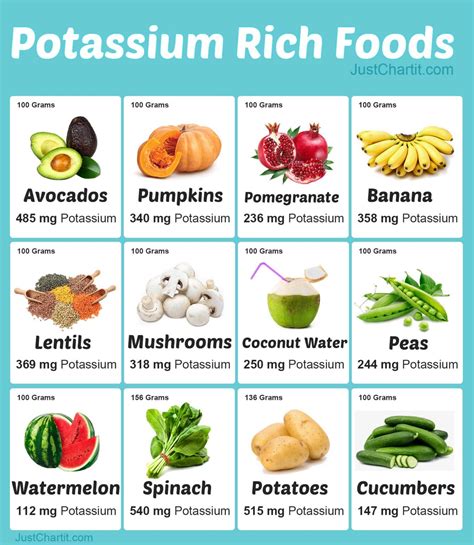
Potassium-rich foods are abundant and varied, making it easy to incorporate them into your diet. Some of the richest sources of potassium include:
- Bananas: One medium-sized banana provides approximately 422 milligrams of potassium.
- Spinach: One cup of cooked spinach provides approximately 840 milligrams of potassium.
- Sweet potatoes: One medium-sized sweet potato provides approximately 542 milligrams of potassium.
- Avocados: One medium-sized avocado provides approximately 708 milligrams of potassium.
- Fatty fish: Fatty fish such as salmon and tuna are rich in potassium, with a 3-ounce serving providing approximately 534 milligrams.
- Legumes: Legumes such as white beans, lentils, and chickpeas are rich in potassium, with a 1-cup serving providing approximately 1,000-1,500 milligrams.
Benefits of Potassium Rich Foods
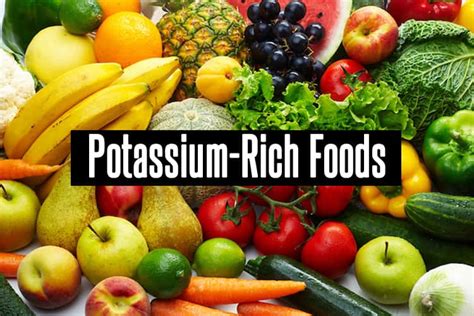
The benefits of potassium-rich foods are numerous and well-documented. Some of the benefits include:
- Reduced risk of heart disease: Potassium helps to lower blood pressure, which reduces the risk of heart disease.
- Improved bone health: Potassium helps to regulate calcium metabolism, which is essential for maintaining healthy bones.
- Reduced risk of kidney stones: Potassium helps to reduce the risk of kidney stones by reducing the amount of calcium in the urine.
- Improved muscle function: Potassium helps to regulate muscle contractions and relaxations, making it essential for maintaining healthy muscles.
Potassium Deficiency

A potassium deficiency can occur due to a lack of potassium-rich foods in the diet, certain medical conditions, or medications. Some of the symptoms of a potassium deficiency include:
- Muscle weakness
- Fatigue
- Heart palpitations
- Constipation
- Abnormal heart rhythms
Causes of Potassium Deficiency
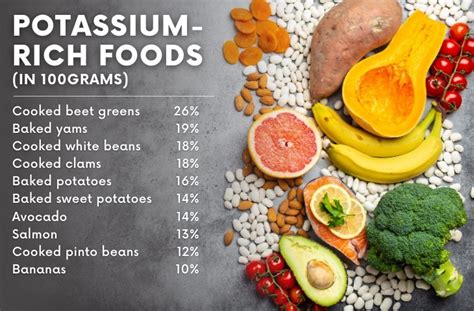
The causes of a potassium deficiency can be varied and complex. Some of the common causes include:
- Inadequate diet: A diet that is lacking in potassium-rich foods can lead to a deficiency.
- Certain medical conditions: Certain medical conditions such as kidney disease, heart failure, and adrenal gland disorders can increase the risk of a potassium deficiency.
- Medications: Certain medications such as diuretics and laxatives can increase the risk of a potassium deficiency.
Potassium Rich Food Groups
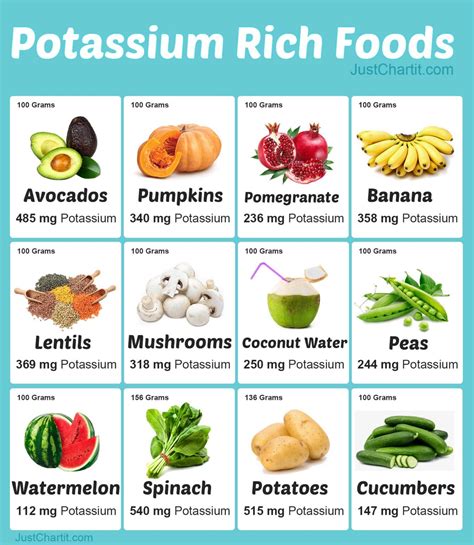
Potassium-rich food groups are varied and abundant, making it easy to incorporate them into your diet. Some of the richest sources of potassium include:
- Fruits: Fruits such as bananas, avocados, and citrus fruits are rich in potassium.
- Vegetables: Vegetables such as spinach, sweet potatoes, and broccoli are rich in potassium.
- Whole grains: Whole grains such as brown rice, quinoa, and whole wheat bread are rich in potassium.
- Lean proteins: Lean proteins such as chicken, fish, and beans are rich in potassium.
- Dairy products: Dairy products such as milk, cheese, and yogurt are rich in potassium.
Increasing Potassium Intake
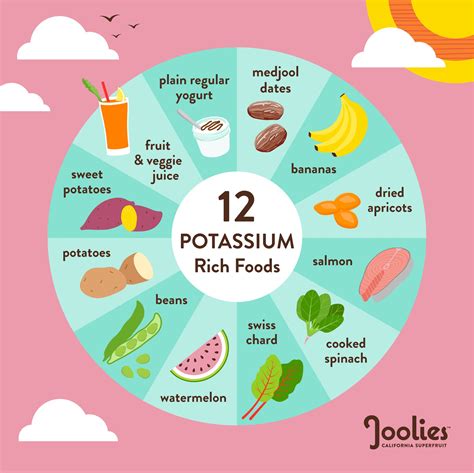
Increasing potassium intake can be easy and straightforward. Some of the ways to increase potassium intake include:
- Eating potassium-rich foods: Eating a variety of potassium-rich foods can help to increase potassium intake.
- Taking supplements: Taking potassium supplements can help to increase potassium intake, especially for individuals who are at risk of a deficiency.
- Cooking with potassium-rich ingredients: Cooking with potassium-rich ingredients such as herbs and spices can help to increase potassium intake.
Potassium and Blood Pressure
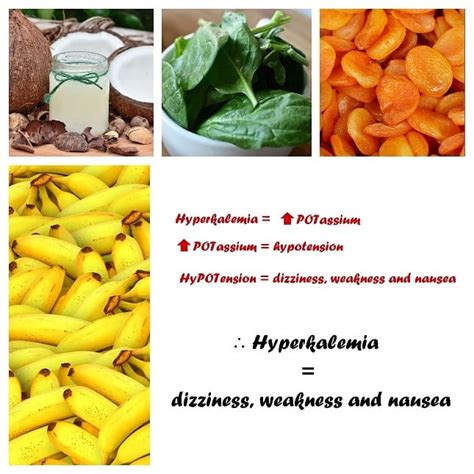
Potassium plays a crucial role in regulating blood pressure. Some of the ways that potassium helps to regulate blood pressure include:
- Reducing sodium levels: Potassium helps to reduce sodium levels in the body, which can help to lower blood pressure.
- Relaxing blood vessels: Potassium helps to relax blood vessels, which can help to lower blood pressure.
- Improving cardiovascular health: Potassium helps to improve cardiovascular health, which can help to reduce the risk of heart disease.
Potassium and Heart Health
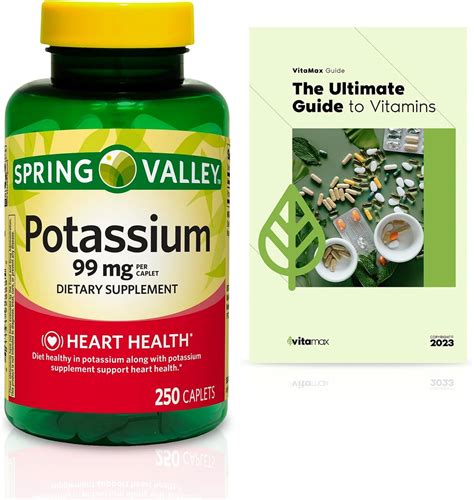
Potassium plays a crucial role in maintaining heart health. Some of the ways that potassium helps to maintain heart health include:
- Reducing blood pressure: Potassium helps to reduce blood pressure, which can help to reduce the risk of heart disease.
- Improving cardiovascular function: Potassium helps to improve cardiovascular function, which can help to reduce the risk of heart disease.
- Reducing inflammation: Potassium helps to reduce inflammation, which can help to reduce the risk of heart disease.
What are the symptoms of a potassium deficiency?
+The symptoms of a potassium deficiency can include muscle weakness, fatigue, heart palpitations, constipation, and abnormal heart rhythms.
How can I increase my potassium intake?
+You can increase your potassium intake by eating potassium-rich foods, taking supplements, and cooking with potassium-rich ingredients.
What are the benefits of potassium-rich foods?
+The benefits of potassium-rich foods include reduced risk of heart disease, improved bone health, reduced risk of kidney stones, and improved muscle function.
Incorporating potassium-rich foods into your diet can have numerous health benefits, from reducing the risk of heart disease to improving bone health. By understanding the importance of potassium and including potassium-rich foods in your diet, you can take a proactive approach to maintaining optimal health. We encourage you to share your experiences with potassium-rich foods and ask any questions you may have in the comments section below. Additionally, we invite you to explore other articles on our website that provide more information on maintaining a healthy diet and lifestyle.
